Bringing German-Style Doener Kebabs to America- Eddie Fahmy's Recipe for Scalable Success
How to successfully scale a food franchise by focusing on authenticity, simplicity, and consistency with German-Style Doener Kebabs.
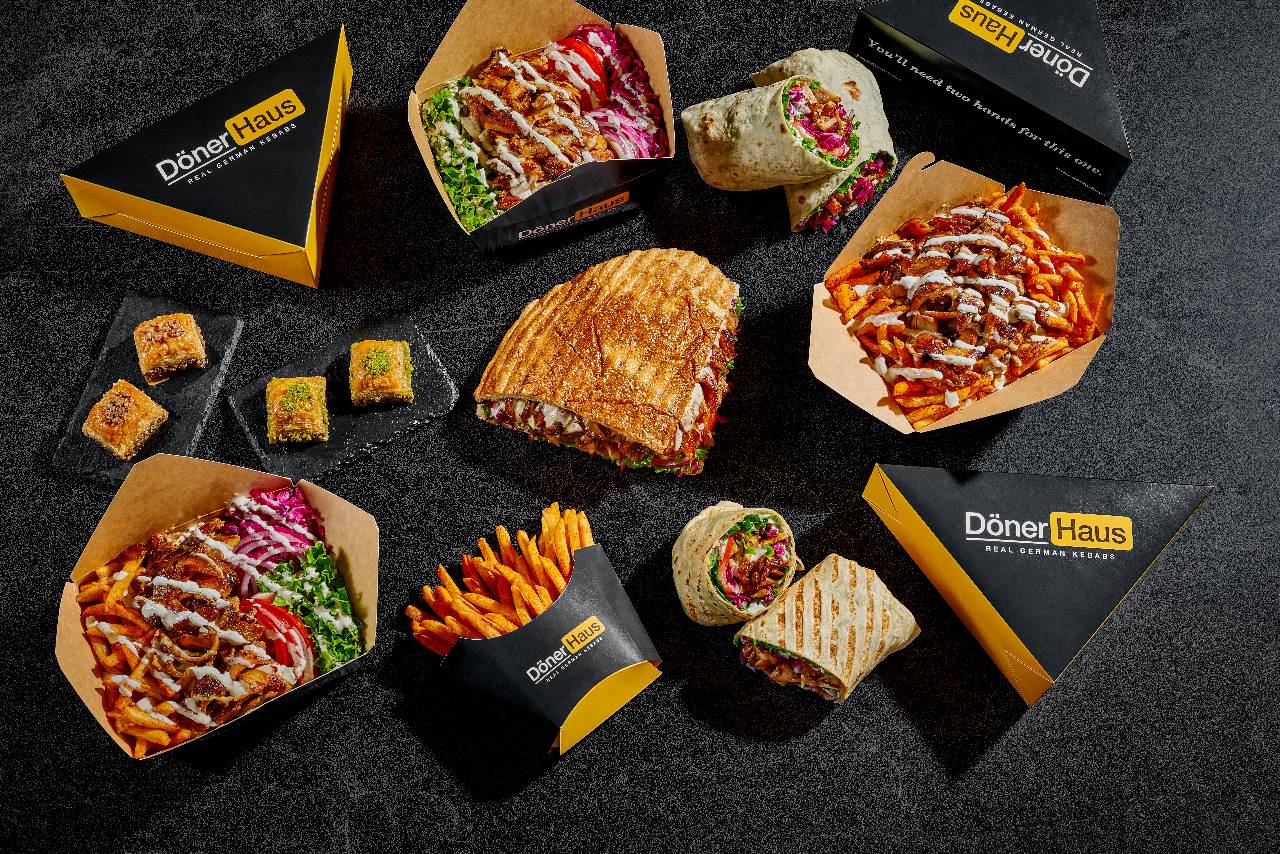
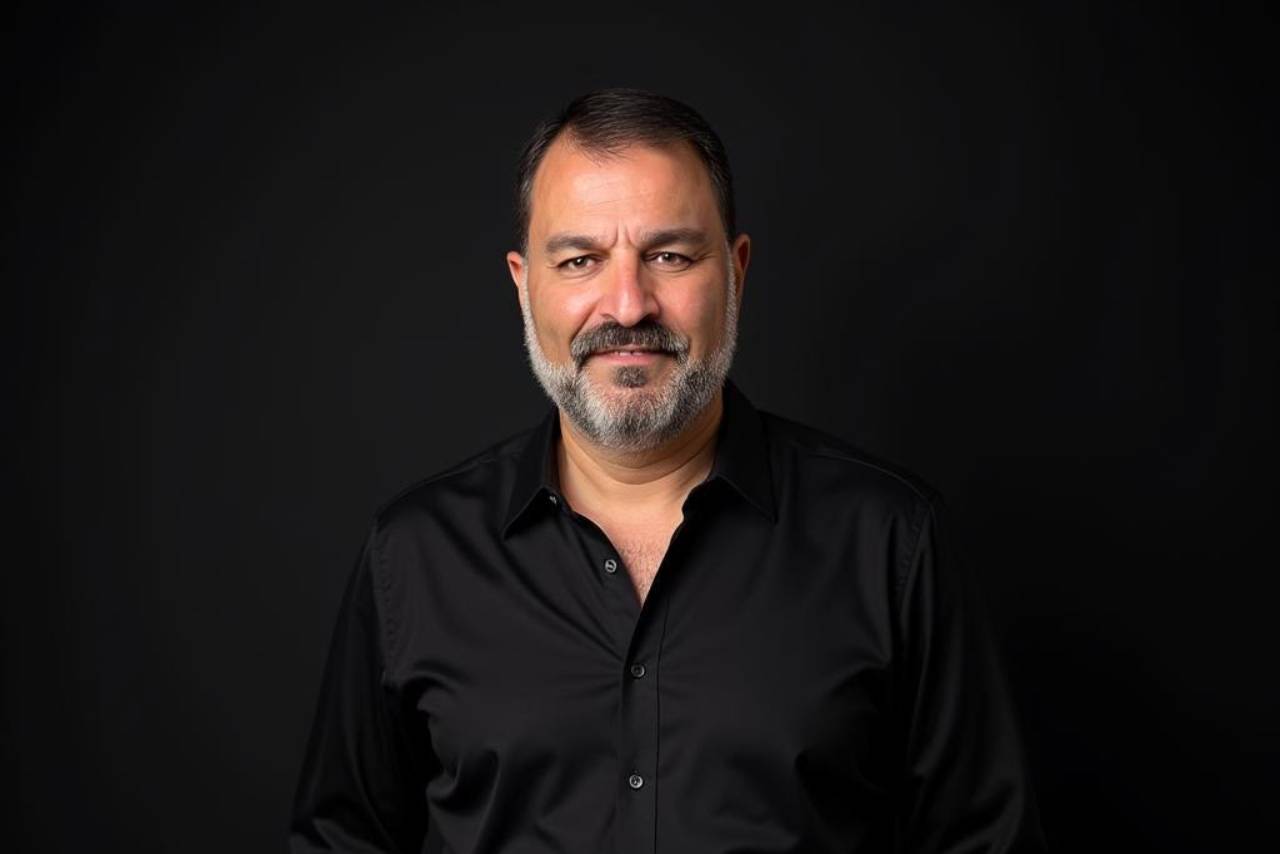
Overview
Doner Haus is quickly emerging as a standout in the U.S. quick-service restaurant scene, offering a focused menu of authentic German-style doner kebabs served with speed, quality, and precision. From its flagship NYC location to over 20 committed franchise units nationwide, the brand's growth has been both rapid and intentional. Driving that success is Franchise Director Eddie Fahmy, whose approach blends operational expertise with strategic insight. While Fahmy has decades of firsthand experience in the restaurant industry, it's his work as founder and CEO of A2Z Restaurant Consulting that truly sets him apart.
Through A2Z, he has helped launch countless hospitality ventures - from fast casual to fine dining - guiding entrepreneurs through everything from build out to grand opening. That consulting experience has become a major asset for Doner Haus franchisees. Eddie brings more than oversight; he brings solutions, systems, and a deep understanding of how to avoid common pitfalls. His ability to translate operational complexity into a scalable, tech-enabled model is what makes Doner Haus different. In this interview, Eddie shares how authenticity, simplicity, and smart growth strategies are driving Doner Haus's rise - and why his unique background is helping franchisees thrive from day one.
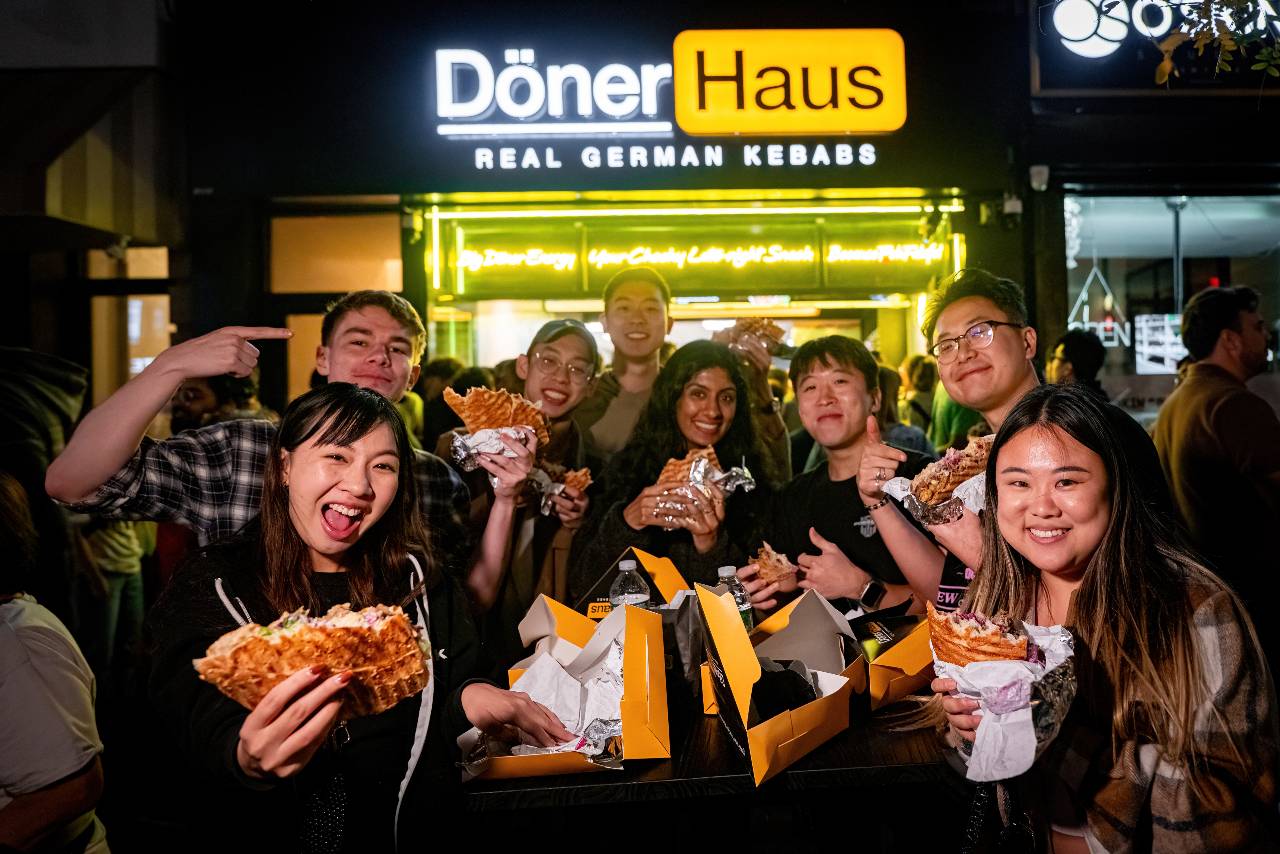
In Conversation with Eddie Fahmy
1. How did you identify the audience for a German-style kebab?
E. In the beginning, it was definitely a challenge to pinpoint exactly who would embrace a German-style doner in the U.S. It wasn't something people were familiar with. But social media quickly became a powerful ally. Platforms like Instagram helped us showcase our food visually, and that made all the difference. Foodies love sharing, and discovering something new, especially international flavors. The viral effect of sharing beautiful, craveable food images helped us reach diverse audiences - everyone from college students to young professionals wanted to try it. The momentum just kept building.
2. At what point did you know it was time to go down the franchise route?
E. After five months of operating our first NYC location, the numbers and customer response were so strong that we knew expansion wasn't just a goal - it was a necessity. From day one, we'd built Doner Haus with scalability in mind, keeping our menu and operations streamlined. But once we saw consistent sales, returning customers, and interest from other cities, the decision to franchise felt natural. Our understanding of the U.S. market gave us confidence that there was unmet demand for authentic German-style doner, and we had the tools to deliver it at scale.
Balancing Growth with Authenticity
3. What were the biggest operational challenges in scaling from one location to multiple units?
E. One of the most difficult parts of scaling was replicating our product consistently across multiple locations. Distribution was a major hurdle - we're talking about specific meats, house-made sauces, and bread like - Turkish Pide - that all need to meet our standards. The recipes are nuanced, and prepping ingredients requires precision. Technology became essential. We implemented kiosks and workforce management tools to reduce training time and improve order accuracy. These platforms help us maintain quality while keeping operations lean. Without streamlining those areas, we wouldn't be able to grow without compromising our brand integrity.
4. How do you determine the right markets for expansion?
E. We focus on high-density urban areas - places where people appreciate diverse food options and are open to new concepts. Cities with sports teams tend to perform well for us because of the foot traffic and event-driven crowds. We also pay attention to communities with a strong Muslim population since we offer 100% halal meat, which aligns with their dietary needs. Our goal is to introduce the doner to areas where it's unfamiliar but has the potential to thrive. We evaluate each market carefully to ensure sustainable growth, not just rapid expansion.
5. What's your approach to balancing consistency with local market customization?
E. We believe in staying authentic and focused. The moment you start making exceptions or customizing too much, you dilute the brand. Our philosophy is- keep the menu tight, do what we do well, and stick to our roots. We don't tailor our offerings to individual markets because the product already has wide appeal. People want authentic experiences, not a version watered down to match local expectations. That simplicity helps us maintain quality control and brand consistency, which is especially important as we scale across different states and regions.
6. What are your biggest sellers?
E. Honestly, all of our menu items perform really well. We intentionally designed a focused menu where every item is made to stand out. Whether it's the classic doner sandwich, the wrap, or the salad box, customers respond positively across the board. Our ingredients - organic halal meats, custom pide bread, fresh toppings - set us apart. Because the menu is tight and every component is carefully curated, nothing gets overlooked. This also simplifies inventory, reduces waste, and helps our staff deliver consistent quality with every order. The simplicity is part of the magic.
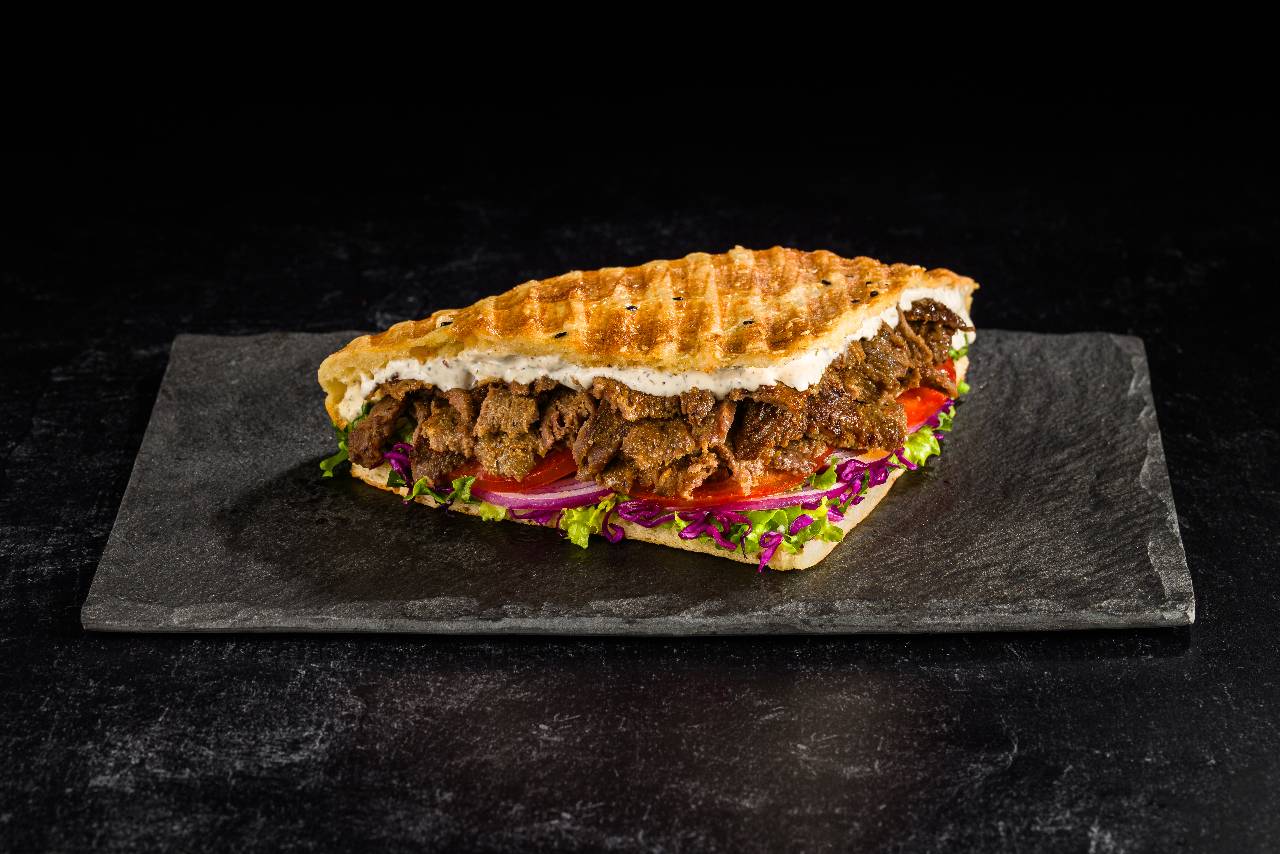
Menu Discipline, Franchisee Fit, and Tech-Driven Operations
7. How often do you introduce new items to the menu?
E. We don't introduce new items. We believe in doing one thing and doing it exceptionally well. It's tempting to expand a menu, especially when customers make requests, but we've resisted that urge. Our menu is purposely minimal to ensure speed, efficiency, and product excellence. Introducing new items complicates training, prep, and operations, which can lead to inconsistency. We'd rather perfect what we offer than risk compromising the brand. That clarity of purpose is part of what makes Doner Haus scalable - and it's a huge factor in our franchise model's success.
8. When it comes to scouting franchisees, what qualities do you look for in potential partners?
E. We're not looking for just anyone with capital. We're looking for partners who understand what doner is and who truly buy into our concept. They need to care about food quality, consistency, and customer experience. That's why our franchise acceptance rate is below the national average - we'd rather grow slowly with the right people than quickly with the wrong ones. We want franchisees who will uphold the standards we've built, follow our systems, and represent the brand with pride. Their success is our success, and alignment from day one is key.
9. How does Doner Haus support new franchisees during their first year of operations?
E. We take franchisee support very seriously. Through A2Z Consulting, which I founded, we help franchisees navigate every step - from site selection and build-out to staff hiring and training. I personally get involved in the decision-making, even working with contractors to make sure everything is executed properly. We provide operational guidance, marketing support, and systems training. Having gone through the challenges of opening and scaling restaurants myself, I know where things typically go wrong - and how to prevent that. It's about setting up every new location for long-term success, not just launch day.
10. If I want to sign up to be a franchisee, what's the best way to get the process started?
E. It all starts on our website. Interested candidates can read about the brand and download our franchise package and company deck. We want people to feel confident that it's the right fit before we move forward. Once we receive the application, we evaluate it based on key criteria - like their background, values, and whether they're a good cultural fit. We don't just look at finances. We also assess whether they're interested in a single unit or a multi-unit deal, and from there, we determine the best path for collaboration.
11. What core operational systems or tech platforms does Doner Haus use to streamline franchise operations?
E. We've invested heavily in technology to make our operations as efficient and scalable as possible. At the heart of our system is POS - it's reliable, intuitive, and allows us to track performance metrics in real time. It integrates seamlessly with our scheduling software, which helps us manage labor and optimize staff hours based on demand. We also use kiosks in our stores to streamline ordering, reduce lines, and minimize human error. These tools are essential not only for daily efficiency but also for maintaining consistency across all locations, especially as we scale rapidly.
12. Does Doner Haus utilize any proprietary appliances or tailored machines for their operations?
E. Absolutely. We use specialized equipment that supports the authenticity and efficiency of our operations. One example is the POTIS machine from Germany, which we use to replicate the traditional doner cooking process. For fries, we rely on Henny Penny fryers, which are known for speed and consistency. Most of the machines we use are German, these choices weren't made lightly - we tested a lot of equipment to find what would deliver the best product every time. Having the right machines ensures that whether a customer visits us in NYC or in a future California location, their experience and meal will be identical in quality.
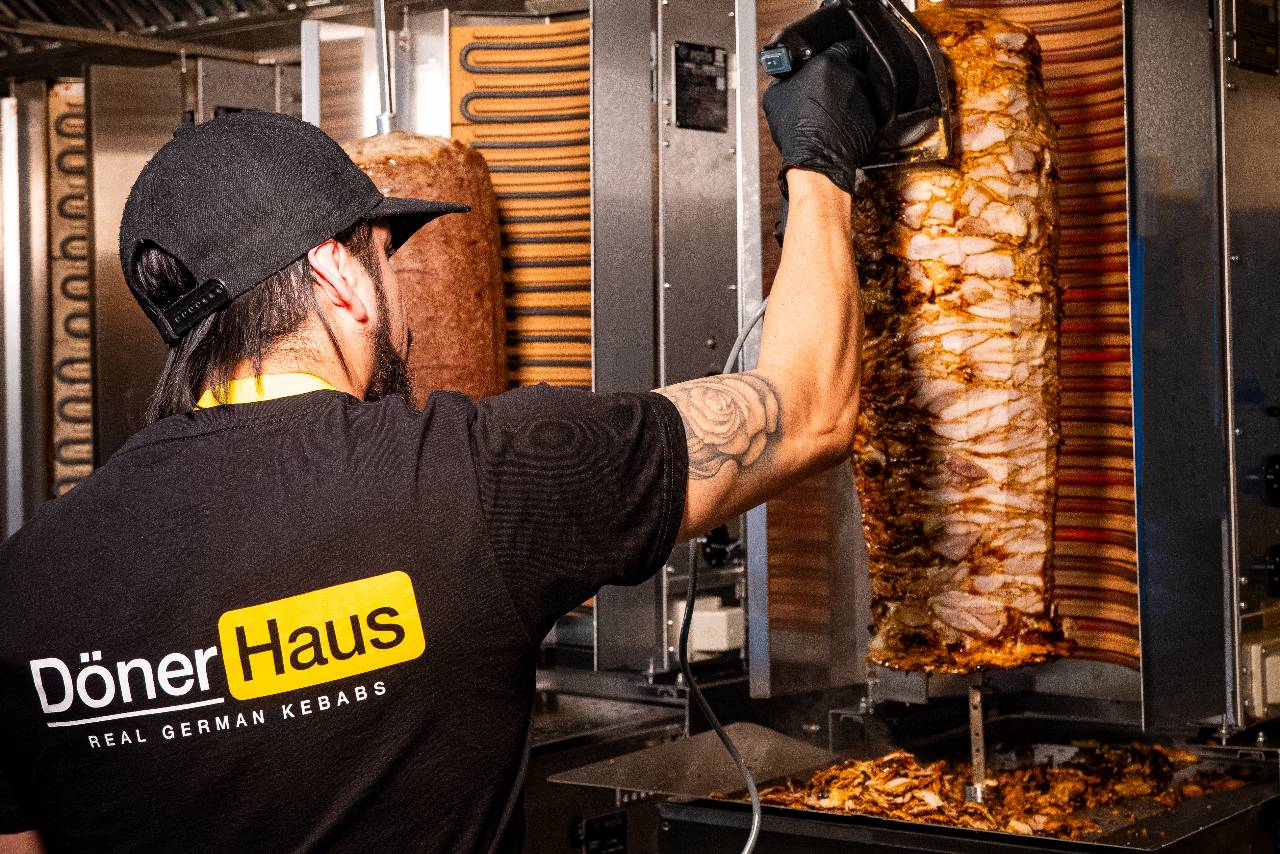
Leadership, Training, and Innovation
13. What strategies have been most effective in driving traffic and repeat visits across locations?
E. Social media has been a game-changer for us in terms of awareness and customer engagement. Our food photographs beautifully, and platforms like Instagram help us reach people who are constantly looking for unique food experiences. Beyond that, we use built-in rewards programs to keep customers coming back. Loyalty programs create a sense of belonging and incentivize repeat visits. We also rely on digital marketing to target local communities around each store. These combined strategies have proven highly effective in building a loyal customer base and maintaining high foot traffic.
14. What's your approach to leadership and communication across the franchise network?
E. I take a very hands-on and collaborative approach. As Franchise Director, I'm involved in everything from development deals to day-to-day decision-making. I believe in clear, consistent communication with franchisees - whether it's sharing best practices, troubleshooting an issue, or planning local marketing campaigns. We treat franchisees like true partners, and that means listening as much as advising. I stay accessible and make it a priority to be involved at every stage, especially during the first year of operations. Strong communication builds trust, which is critical when you're growing a network across multiple cities and states.
15. What role does employee training and retention play in overall operational success?
E. Training and retention are huge. The more you train your team, the more confident and consistent they become, which directly impacts the customer experience. We believe in cross-training so that every employee understands multiple roles - from prep to register to opening and closing procedures. Right now, we use manual checklists to ensure tasks are completed properly, but we're actively looking for training platforms that offer digital video content and on-demand modules. Retaining great staff reduces turnover costs and improves operational flow. A well-trained, happy team can make or break a restaurant's success.
16. What's the average timeline from franchise opening to profitability?
E. We're still in the early phase of our franchise rollout, but based on our NYC locations and early data, we generally see revenue gains around the six-month mark. Of course, profitability depends on several factors - location, staffing, marketing efforts - but we've designed our model to have low overhead and fast throughput. Because we use small footprints and efficient layouts, our stores can reach breakeven more quickly than traditional restaurants. Franchisees who follow the model and invest in training and local marketing often see a faster ramp-up.
17. How do you stay agile and innovative in a competitive and fast-changing industry?
E. Agility comes from openness to change and a willingness to adapt. I'm a strong believer in using technology to simplify operations and improve the customer experience. Whether it's automation, digital ordering, or performance tracking, we look for tools that reduce complexity without sacrificing quality. We're constantly evaluating new solutions that can help us improve - whether that's in kitchen workflow, training systems, or customer engagement. We also stay connected to industry trends but are careful not to chase every fad. The key is to stay modern while remaining true to what makes our brand special.
18. Are there any new formats (e.g., ghost kitchens, kiosks, non-traditional venues) Doner Haus is exploring?
E. Right now, we're sticking with our core restaurant format, but I'm always open to discussion. I personally don't love ghost kitchens because they lack the customer connection and experience we value. But food trucks? That's an idea we're open to. They offer flexibility, mobility, and a chance to test new markets without committing to a full build-out. The key is making sure any new format still supports the quality and efficiency we're known for.
19. Where do you see the brand in the next 3-5 years, and what's next on the growth roadmap?
E. Based on our early success and the overwhelming interest in franchising, I see us operating 40 to 60 locations within the next few years. Our immediate focus is on expanding in California and Chicago, which are both great markets for us. But beyond that, we're looking at national growth. The goal is to be the go-to name in authentic German-style doner across the U.S. We've built a brand that's scalable, unique, and high-quality - and now it's about choosing the right partners and markets to grow thoughtfully and sustainably.
Key Themes and Insights
The interview with Eddie Fahmy highlights several powerful themes that explain Doner Haus's rapid growth and enduring appeal.
One key insight is the brand's commitment to authenticity. From sourcing 100% filler-free halal meats and custom German equipment to refusing menu dilution, Doner Haus is laser-focused on delivering a true doner experience. Eddie's motto - Do one thing and do it right - is more than branding; its operational philosophy. This dedication to quality is evident in every part of the business, from recipe integrity to franchisee training.
With small-footprint stores, a limited menu, and strategic use of technology like POS and kiosk ordering, Doner Haus minimizes complexity while maximizing efficiency. This streamlined approach empowers new franchisees and allows for consistent quality across locations.
Franchise growth is treated as a relationship, not a transaction. Eddie emphasizes selecting the right partners over fast expansion, choosing values-aligned franchisees who buy into the concept. His role as both Franchise Director and consultant means each location benefits from deep hands-on guidance - from site selection to opening day.
Technology and adaptability also emerge as critical themes. Whether through training checklists, loyalty
programs, or workflow automation, Doner Haus embraces innovation to stay agile in a competitive market. Yet despite this forward-thinking mindset, Eddie avoids trends that don't align with the brand - such as ghost kitchens - showing a commitment to long-term integrity over short-term gains.
Above all, the interview reveals a brand with a clear identity, a proven model, and a leader whose experience and passion continue to guide its success.
